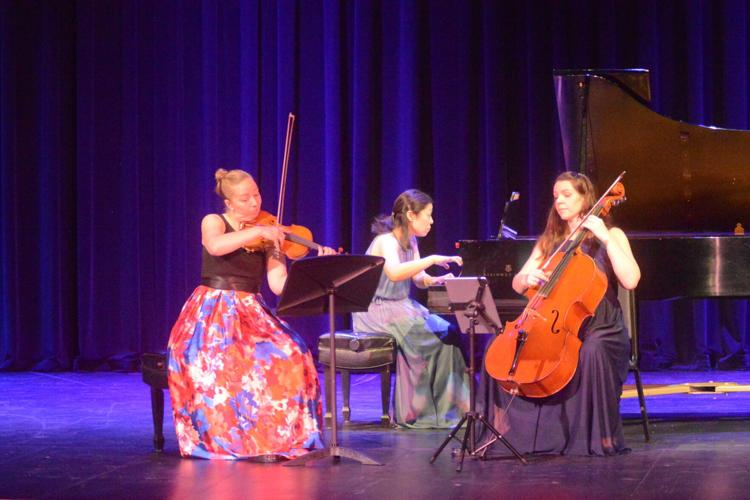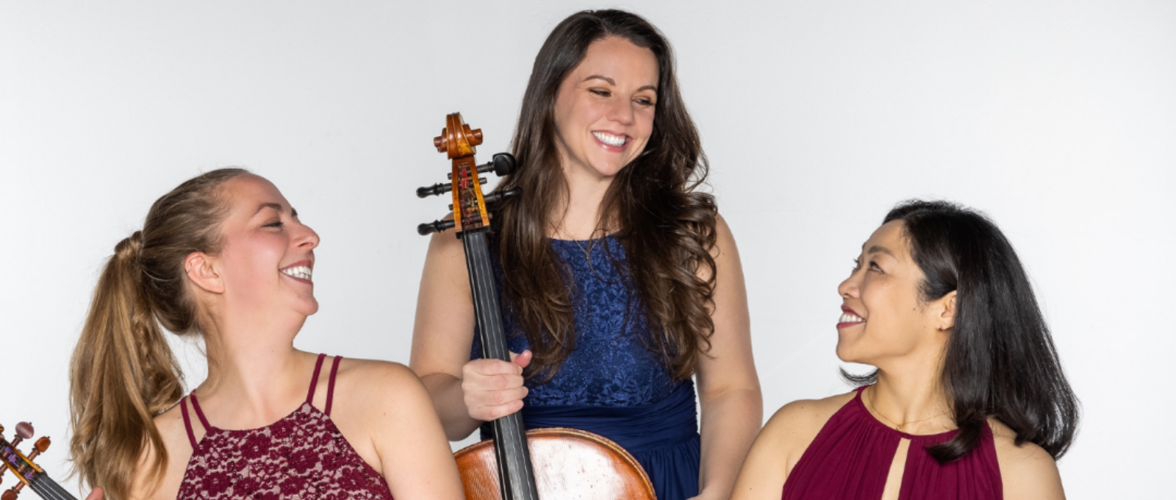On Sunday, when the Champlain Trio performed works of Robert Schumann and Frank Bridge at the Dibden Center for the Arts in Johnson, it revealed an ensemble of musical maturity and expertise. Soon to enter its fourth year, the three players have been working together consistently and intensely — and it shows.
“We still religiously rehearse each week — twice, sometimes more,” explains cellist Emily Taubl.
“The musical results for us are very fulfilling,” adds pianist Hiromi Fukuda.
“More so with every concert,” says violinist Letitia Quante.
Plainfield Arts will present the Champlain Trio in “Fall Fantasy,” repeating Sunday’s program at Vermont State University-Johnson, at 4 p.m. Sunday Nov. 12 at the Plainfield Opera House. The trio’s first two concerts in Plainfield sold out quickly, so this one is likely to as well.
The Champlain Trio is a product of the COVID-19 pandemic. When three topnotch Vermont instrumentalists found themselves prevented from working, they decided to take the time to form a truly cohesive permanent ensemble.
In a move of sheer genius, they decided to tour the state’s empty concert halls, filming their performances and interviews with local arts leaders. “Empty Stages,” the documentary created by star Vermont filmmaker Jay Craven, premiered on Vermont PBS in June 2021. (It’s still available for viewing on the trio’s website.)
The three are all highly respected Vermont musicians, but all began their professional careers at New York’s Juilliard School. Among them, they hold positions at the Vermont Symphony Orchestra, Springfield Symphony Orchestra, Amherst College, the University of Vermont and Middlebury College.
“When we’re exploring new music, there’s a lot of talking, discussion involved, and then we start putting the ‘pedal to the metal’ every moment of our rehearsal,” Quante said Tuesday in an interview with the trio. “Then, once we get through a series of concerts, we’re back to the big discussions. I just like the overall cycle.”
And the interaction is intense.
“Speaking, giggling,” Taubl said, laughing. “Sometimes we have text thread that’s all day.”
“Nonstop from first thing in the morning!” Quante added.
“Fall Fantasy” is a program of fantasies by Bridge (1879-1941) and Schumann (1810-56), as well as Alice Vierne-Bredt (1868-1958) and Walter Rabl (1873-1940), all Romantics from early to late. The program emanated from their discovery of Verne-Bredt’s Phantasie Piano Trio.
“We were looking for something that was not a full-scale 30-minute trio, but 10 to 15 minutes that can be added to any other program,” Taubl said. “When we found this piece, we loved it and actually performed it during the summer in other programs.”
And then, from there, what other fantasies? Of course, Schumann was an obvious choice.
“I knew about the Bridge, but I hadn’t played it,” Taubl said. “That was a big one we should probably get to.”
Rabl’s Fantasiestücke for Piano Trio, Op. 2, with its eight short deeply Romantic movements, they called the wild card.
“The third movement with the cello opening settled it,” Quante said.
“The opening is so magical,” Fukuda added. “Apparently, Brahms thought really highly of him as a young composer.”
“And it’s a really hard piece, actually,” Taubl said. “It sounds light, but it’s really virtuosic. Five sharps, five flats, it’s really taxing, a very technically demanding piece. As light as it sounds, it was almost like learning a big trio.”
Apparently, Fukuda talked the other two into Schumann’s Fantasiestücke in A minor, Op. 88. The four-movement work isn’t as cohesive as the composer’s great piano trios but is full of beautiful music. (Schumann was the subject of Fukuda’s doctoral thesis at Juilliard.)
“We did need to do one piece that people knew the name of,” Taubl said, adding. “It’s the Schumann that helped us get better faster than the others — by far, the hardest to put together.”
“It’s the piece we had the most discussions about how to play it,” Quante said.
“We haven’t done any of Schumann’s piano trios, so this was a good way to get into it,” Taubl said.
Bridge’s 1907 Phantasie in C minor, H. 79, is a powerful and substantial work, owing plenty to the great French Romantic composers as well Brahms, a masterpiece.
“It felt the most natural,” Quante said.
“It’s a strange rhythm, but after that, the flavor and the language were something we were familiar with, maybe because we did the ‘French Voices’ program — we did Fauré, we did Ravel,” Fukuda said. “All of that harmonic language really translates well into Bridge.”
“I think the Rabl also tied into it, and the Verne-Bredt a little bit, but there’s a little jazziness to it. It’s a rich piece,” Taubl said. “I think we’ll keep that one in our back pocket.”
Where to from here? After a holiday Candlelight Concert at the Essex Experience Dec. 16, the Champlain Trio heads to Massachusetts in March, with concerts in Amherst, Springfield and Deerfield.
“We have a residency coming up at Deerfield Academy where we’re working with their students on all female composers,” Taubl said. “I think we want to still continue bringing great pieces that people have overlooked.”
jim.lowe@timesargus.com / jim.lowe@rutlandherald.com
Plainfield Opera House Plainfield Arts presents the Champlain Trio in “Fall Fantasy” at 4 p.m. Sunday, Nov. 12 at the Plainfield Opera House, 18 High St. in Plainfield. Violinist Letitia Quante, cellist Emily Taubl and pianist Hiromi Fukuda will perform music by Robert Schumann, Frank Bridge and more. Admission is by donation ($20 suggested); for tickets, reservations or information, go online to www.plainfieldartsvt.org For information about the Champlain Trio, go to www.champlaintrio.com




